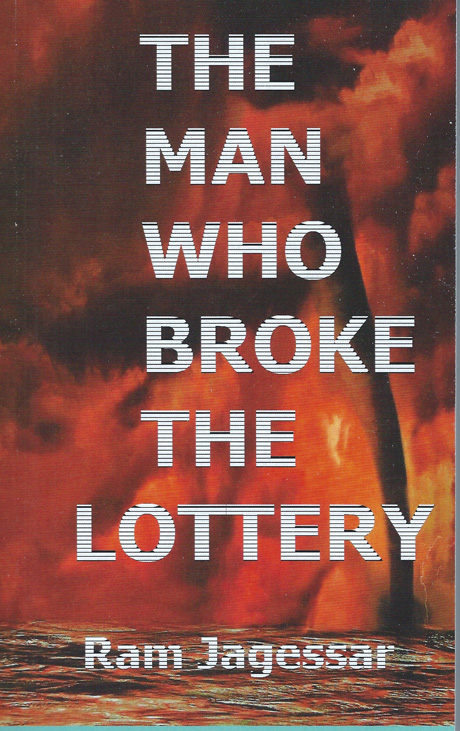January 9, 2019 issue
Authors' & Writers' Corner

Kamil Ali
The pungent odor of burning flesh invaded Molly’s sleep in the middle of the night. Her eyes flipped open, and she froze with fear at a movement at the side of her vision. The rocking chair in a corner of her bedroom swayed back and forth on its own. A glance at the locked and shuttered windows that she had recently replaced appeared airtight. The mysterious draft that set the chair in motion and dropped the temperature sent her deeper under the bedcovers.
As the only surviving relative, Molly had inherited the old house from her grandmother through her single mother, who had never disclosed Molly’s father. The last in line of the three women kept the décor and furnishings the way her grandmother had set it up, and her mom had maintained, including a night light in each room of the house.
The unmarried thirty-one-year-old bus driver lived alone after losing her grandmother to dementia ten years before. Her mom had died of the same disease five years later. She had tried to trace her ancestry on suspicion that she might have been adopted, but no agency had a record of her adoption.
Molly sprang out of bed and rushed to the kitchen. The interior light of the fridge illuminated the stove on the opposite wall through its wide open double-doors. Blue flames shot six inches into the air from three of the burners. The fourth burner made Molly sick to her stomach. Her ten-inch-long, eight-inch-wide piranha flipped from one side to the other in the searing heat, swimming in an upright position for a few seconds between each flip. The fish bared its razor-sharp teeth in an evil grin. The reflection of the blue flames danced purple in its red, glossy eyes.

Molly scurried back to her bedroom without another glance at the twenty-gallon fish-tank. She slammed the door shut and dived under the covers. The rocking chair remained still, and the temperature returned to normal. Molly stayed alert until daybreak but experienced no more strange events.
Exhaustion urged Molly to take a sick day off work but leaving the house to relieve her tension held better appeal. Bolstered by the light of day, she opened the bedroom door to use the bathroom next door for a shower in preparation for work. A glance at Diablo’s tank stopped her forward movement for a moment. The missing fish prompted a search. Molly surveyed the area around the aquarium but did not find Diablo. She tiptoed to the kitchen and gasped when she spotted gray ash in the shape of Diablo across the burner that he had hovered over in the light of the fridge. She backed away into her bedroom and put on her work uniform for a hasty escape from her confinement with terror.
Frequent glances at the house while waiting for a bus across the street unnerved her. Movements through the windows and lights going on and off sent her hurrying to the next bus stop. Halfway through her trip, a sudden downpour of heavy rain soaked her to the bone a few minutes before a bus appeared. She flagged it down with the desperate hope that it would pick her up between stops. When it pulled up, and the doors opened, she climbed on board with a smile and a thank you to the driver, who nodded at his colleague and waved her in for the trip to the depot to get her own bus. When the door closed and the bus started moving again, she had misgivings. Instead of the usual standing room only at rush hour, the empty bus gave her a sick feeling in the pit of her stomach. She grabbed the first seat next to the door to keep an eye on the route the driver used. Alarm surged through her when she did not recognize any landmarks along the track she had used every day for the last ten years.
Like the bus did for Molly, it stopped to pick up rain-drenched passengers along the way, once they hailed it. They shuffled in and thanked the driver before moving to the back. The cold and rain gave their skin a gray tone and a foul smell.
After the tenth passenger pickup, the stench emanating from the back of the bus made Molly gag. She covered her nose and glanced behind her. A shriek escaped her throat when a standing-room-only crowd swayed with the motion of the bus. Each passenger stared straight ahead in a trance without blinking. The driver grinned at Molly while peeling off his facial skin and taking off his hat. Long white hair cascaded down to his shoulders, and he took on her features.
A tap on her shoulder spun her head around. Her dead mother’s twisted grin with missing front teeth pointed to the driver in answer to Molly’s questions about her father. Her grandmother tapped the other shoulder and gestured to the other passengers to indicate ancestors. The distracted driver took his hands off the steering wheel, and the bus careened into guardrails at the edge of a cliff. Molly sprang into action. She grabbed the steering wheel, but the bus broke through the metal barrier and nose-dived toward the rocks a hundred feet below.
Molly’s delusions had resolved her doubts about parentage, but a bus-load of morning rush hour commuters had paid the price for her dementia.
sharp dialogue

Ram Jagessar, The Man Who Broke the Lottery
A review by Kennard Ramphal
Ram Jagessar is a Trinidad-born Canadian, and is a member of the Carican group of writers. Although this is his first published novel, Jagessar is a prolific writer, and worked as a journalist in Trinidad for many years. He has published numerous articles and magazines.
The dream of most Canadians is to win the lottery, but they see “Not a winning ticket” flashing on the screen whenever they go to check their tickets. After reading these four words for twenty years Sunil, the protagonist of Jagessar’s novel, discovers the joy and anguish of achieving the Canadian dream many times. Sunil, an immigrant like Jagessar, is elated when he is told that he holds the winning ticket for fifty million dollars in the Top Lotto draw, and later discovers that he also bought the winning ticket for the nineteen million Lotto 659 draw.
When he shows his accountant friend, Ramesh, his second winning ticket, Ramesh tells him, “This is trouble, boy. Big trouble. As your friend, I will tell you to burn this ticket.”
If this is not enough, Sunil wins two million dollars in the Winontario draw, and Ramesh starts to panic.
“Jai Hanuman. Somebody bound to go to jail this time.”
Sunil’s wife, Sushila, shares Ramesh’s consternation when he hands her the Winontario ticket and exclaims, “Bap ray! This is trouble. Serious trouble. I don’t want it.”
From here the plot unfolds like a runaway racehorse with numerous unexpected twists and turns and spectacular crashes, as Sunil literally takes the smug and complacent lottery industry to the cleaners. Sunil’s addiction becomes evident. He cannot stop buying tickets, and cannot refuse the money he wins, even though he does not need the money, and he knows that trouble is afoot.
The billion-dollar lottery industry with its bean counter actuaries and oddsmakers is simply aghast at Sunil’s winning streak, so accustomed are they to taking easy money from millions of suckers. The thoroughly entertained media promptly labels Sunil the lottery terrorist, a man more damaging than Osama bin Laden in his time. They join the host of people – family and friends looking for a bite of the pie while it’s still hot, salespeople and potential investors of every shade, and in the background criminals and con artists eager to grab a share of the bonanza – and hotly pursue Sunil for news scoops.
A wild ride it is indeed. On a roll, he and Ramesh go to Washington D.C. and Sunil buys tickets for the Powerball lottery. The grand prize is $327 million U.S. and, if you guess that Sunil wins the $327 million prize, you are correct. Sunil not only wins the $327 million prize, but four other prizes.
Here, and throughout the novel, Jagessar demonstrates his laudable writing skills to describe the incident and the characters involved when Sunil hands over his five tickets.
“Fresh faced young lady became a pale-faced young lady as she perused the tickets and then Sunil’s face . . . Her eyes opened wide and her eyebrows climbed vertically as Sunil’s grin widened horizontally across his face. The Terrorist had come to America.”
Jagessar uses the opportunity to poke fun at America which, unlike Canada, deducts taxes from lottery winnings. Sunil accepts the lottery payout as part of the “reparations for the war of 1812 . . . when the Americans invaded Canada and burnt down the Canadian parliament.”
Nobody is spared the lash of the Terrorist, not the lotteries, horse racing, casinos, online computer games, even bingos, though Sunil tries to keep some of these expeditions quiet. But what most infuriates the gambling establishments and delights the public is Sunil’s thoroughly disrespectful attitude as he takes his million-dollar jackpots.
The man is a menace, he must be stopped somehow, or at the least forced to reveal his secret of winning, and winning against all odds.
Jagessar takes the fast-moving story like a Sherman tank crashing through the despairing lotteries of North America, and most readers will devour the book in one sitting, filled with chuckles and secret smiles. The Man Who Broke the Lottery is funny with sharp dialogue and many writers may want to emulate Jagessar’s style.
Jagessar is an expert in the use of appropriate language in various contexts. The reader will notice the language shift in Big Ass Bhola’s exhortation as he attempts to get money from Sunil. “I bet you are ready to give Big Brother a little share right now! Family is family. Blood is thicker than water.”
Compare this language with the language employed when the university professor expresses a desire to study the limits of Sunil’s science of winning. The professor offers to do a study involving, “Full parameters, tested on a scientific basis, double blind studies.”
And when the U.S. lottery official asks Sunil if he may speak with him privately, Sunil responds, “No, you may speak with me publicly. I have submitted five lottery tickets worth over 387 million dollars. Talk to me about that.”
Hope comes towards the end of the novel when Sunil consults a swami and receives spiritual advice and hints of the need for a better public relations face. After taking some appropriate action, and a scary climax, the lottery menace seems to take a vacation, but is he really gone?
Overall, Jagessar’s book is not an immigrant story. Also, it is not a novel dealing exclusively with winning the lottery. The book deals with, among other things, our deepest desires, greedy people, philanthropy, relations between Canada and the U.S. and survival in a very humorous way.
Reading The Man Who Broke the Lottery is a good way to spend an afternoon. Copies can be obtained from amazon.com or from ram.jagessar@gmail.com, telephone: 416-289-9088.